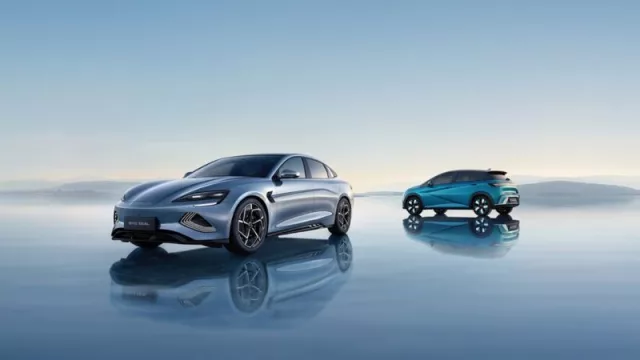Summary and Key Tips
BYD is positioning itself as a key player in the European electric vehicle market, with a focus on expansion and technological innovation. As the company builds new factories and develops advanced charging solutions, its ability to overcome cultural and acceptance challenges will be crucial to its success. Competition with local brands, combined with its ambitious export goal, could redefine the automotive landscape in Europe and beyond. For investors, BYD represents an interesting opportunity in a rapidly evolving market.
-
Expansion Strategy: BYD will build factories in Hungary and Turkey, and is evaluating a third in Germany to optimize costs and avoid tariffs.
-
Technological Innovations: The company will introduce a fast-charging system that could compete with traditional fuel pumps.
-
Competitive Market: BYD aims to double its sales in Europe, facing competition from local brands like Volkswagen and Tesla.
-
Investor Tips: Watch innovation trends, evaluate the growth of the electric vehicle market, and the brand's acceptance in Europe.
BYD's Expansion Strategy in Europe
New Factories on the Horizon
BYD has announced the construction of its first plant in Hungary, which will begin producing vehicles by the end of 2025. With an initial capacity of 150,000 units annually, this number is expected to double in the coming years. Additionally, the company has confirmed a second plant in Turkey that will open its doors next year, with a similar capacity. These factories will allow BYD to avoid European tariffs that are often a significant barrier for Chinese brands.
The potential location of a third plant in Germany is strategic, as it would help bypass the additional 17% tax that the European Union imposes on electric cars coming from China. However, the decision is not without challenges, given that Germany has high labor and energy costs, which could complicate operations.
Technological Innovations to Attract Customers
BYD is heavily betting on technological innovation to convince European consumers, who are often skeptical about Chinese electric vehicles. The company has developed a new fast-charging system that promises to offer 400 kilometers of range in just 5 minutes of charging. This equates the charging experience of an electric vehicle to that of a conventional fuel car, a major breakthrough that could change public perception of the viability of electric vehicles.
Competitive Market: Challenges and Opportunities
Market Positioning
Currently, BYD ranks third in electric vehicle sales in Europe, behind SAIC and Geely, but with projected growth that could take its sales to over 100,000 units this year. According to Schmidt Automotive Research, BYD sold 41,000 units last year, and this number is expected to double, reflecting the growing acceptance of the brand on the continent.
To put this in perspective, Volkswagen leads the European market with 413,500 units sold, followed by Tesla with 311,600 units. With increasing competition, it is crucial for BYD not only to maintain its growth pace but also to address the cultural and acceptance challenges it faces.
Impact of Innovation on Growth
The investment bank UBS has noted that BYD's growth in Europe will depend on its ability to innovate and adapt to local demands. The recent raising of $5.6 billion through the sale of shares in Hong Kong will allow BYD to finance its expansion and strengthen its export program, with an ambitious target of 800,000 units for next year.
Implications for the Future of the Automotive Sector
Competition with Local Manufacturers
BYD's expansion in Europe could pose a serious threat to local manufacturers, especially in a market that is stagnating. UBS highlights that any market share gain by BYD implies losses for European manufacturers, a scenario that could become even more complicated if the Chinese brand manages to establish itself as a strong competitor.
The Need for Global Acceptance
BYD's acceptance in Europe will be crucial for its future success. Despite innovation and production capacity, the brand must work to build trust among European consumers. The perception of Chinese electric vehicles has historically been negative, presenting a hurdle to overcome.
Stay informed about how BYD faces other manufacturers and what strategies they use to differentiate themselves in the constantly evolving electric vehicle sector.
Frequently Asked Questions (FAQs)
What are BYD's expansion plans in Europe?
BYD is building factories in Hungary and Turkey, and is evaluating a third plant in Germany.
What innovations is BYD introducing?
The company is developing a fast-charging system that allows adding 400 kilometers of range in just 5 minutes.
What is BYD's position in the European market?
Currently, BYD ranks third in electric vehicle sales in Europe and aims to double its sales this year.
How will BYD's arrival affect local manufacturers?
BYD's expansion could mean market share loss for local manufacturers in a stagnating European market.
What should investors consider about BYD?
Investors should monitor technological innovations, the growth of the electric vehicle market, and BYD's international expansion strategy.
Follow us on: IG: @infonegociosmiami (Síguenos).
Subscribe for free to receive all strategic information and be part of the largest business and culture community across the Anglophone-Latino world!:
Contact Infonegocios MIAMI:
Read Smart, Be Smarter!












Tu opinión enriquece este artículo: